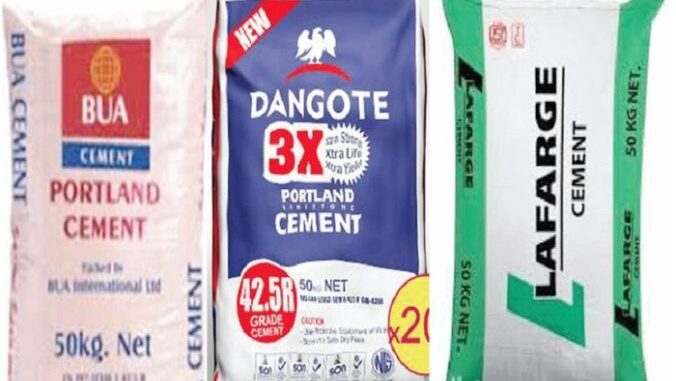
Major cement manufacturers, including Dangote, BUA and Lafarge are considering crashing the price of the product.
This was disclosed by David Umahi, Minister of Works, who read a communique at the end of a meeting with the management of the companies in Abuja on Monday.
This follows the recent increase in the prices of cement, reaching as high as N13,000 in some retail stores in the Federal Capital Territory.
According to him, cement manufacturers admitted the high prices in some parts of the country, adding that the retail price to a consumer should not cost more than N8,000 per 50kg bag of cement.

He said, “The essence of this meeting is the concern of the public and also the fact that this ministry since August has been preaching on how we can utilise our local contents in the construction of our roads. At the time we think we are winning we are now having these issues.
“Certain issues including smuggling, bad roads, high energy costs, and the forex crisis caused the high price but manufacturers have expressed their readiness to willingness to bring down the prices in future.
“The cement manufacturer noted that the present high cost of cement in the market is very much abnormal in some locations nationwide. Ideally, they noted that cement price, and retail price to a consumer should not cost more than between N7,000 to N8,000 per 50 kg bag of cement.
“Therefore, the government and the cement manufacturers- Dangote Plc, BUA Plc and Lafarge Plc have agreed to have their cement price nationwide between N7,000 to N8,000 naira per 50 kg pack of cement, depending on the locations, which means that this price depends on the locations. Going forward, the government advised manufacturers to set up a price monitoring mechanism to ensure compliance with the prices that are set today.”
In her remarks, Doris Uzoka-Anite, minister of Industry, Trade and Investment said, decried the increase in prices of cement, noting that the cement sector was a major beneficiary of the government’s Backward Integration Project (BIP) which was aimed to boost cement production as well as regulate the prices of the commodity.
“But to our shock, we have seen the prices go up, despite that most of the inputs are sourced and produced locally. It became important for us to call you to the table to understand why it is surging, given the fact that the BIP which gave cement manufacturers the push for production, was to ensure that we manage prices and manage the development of the sector.
“We are very concerned about the surge in the prices of everything including cement and for us, the ministry regulates the development of cement,” she said.

Be the first to comment